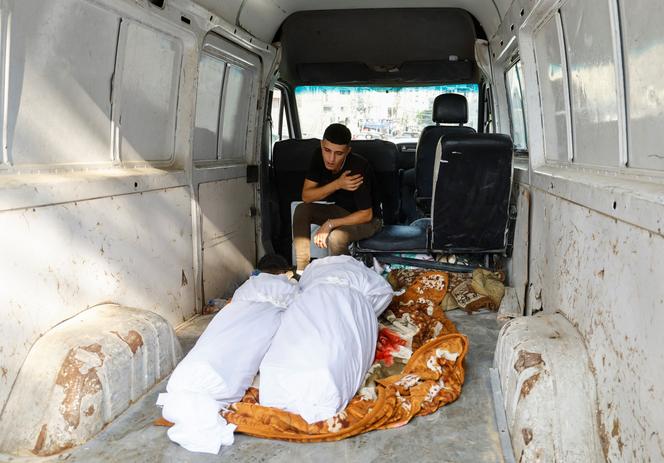


By late afternoon on Monday, October 9, Gaza had been under intensive bombardment by Israeli fighter planes for almost 24 hours. The Abou Dan family was holed up at home, in the Bureij camp in the center of the enclave. Everyone kept checking their phones to make sure that no message had been sent from the Israeli army telling them to evacuate their home. "There was no warning shot, no text message, nothing. All of a sudden, a bomb fell, then two," said Ahmed Abou Dan over the phone – Gaza has been inaccessible since Saturday.
This 43-year-old Palestinian was the only survivor of his siblings who, as is often the case in Gaza, lived in the same building. His son, his father, his two brothers and part of their family were killed. Fourteen people in all, including four children and two teenagers. One of his nieces was pregnant.
"So far, I've buried 10 martyrs, but four are still under the rubble. I'm moving heaven and earth. We extracted my brother's family. But my son, Walid, 22, is still under the rubble, as is my niece Amira, 16, and one of the children of another niece – he was 7, I think. Isn't it despicable to have killed them?" he asked, his breath coming in angry gasps. The next day, the bodies found under the rubble were hastily buried – yet another humiliation. "It wasn't a funeral, we took them, buried them and left. Meanwhile, the bombs continued to explode," he recalled.
Twenty-seven people, including 15 minors, were killed on the day of the strike on the Abu Dan family's building in the Bureij camp and the surrounding localities, according to the count by Al-Mezan, the Palestinian Center for Human Rights (PCHR) and Al-Haq, three Palestinian human rights NGOs. Ahmed Abou Dan realized it was a miracle he had survived: "It was very violent: The bombing destroyed our building, which is 35 meters high. Imagine a four-story building collapsing on you. I live on the third floor. Both walls fell on me. I was terrified. What can you feel at that moment? Fright. Fright! I recited my profession of faith."
Eleven other members of his family survived, including his wife, whose hip was shattered. He recounted his story in one big rush, moved by emotion. In their street, only their house was bombed. Ahmed couldn't explain it. His brother was a worker in Israel, so he had a permit to leave Gaza, impossible to obtain if the Israeli intelligence services had the slightest doubt about his security background or that of his family. Ahmed himself had twice been to Jerusalem, where his son was being treated for a neck problem. The Israeli army, questioned by Le Monde on this subject, did not reply.
You have 66.97% of this article left to read. The rest is for subscribers only.
